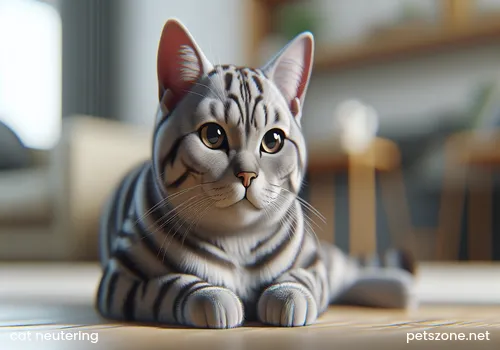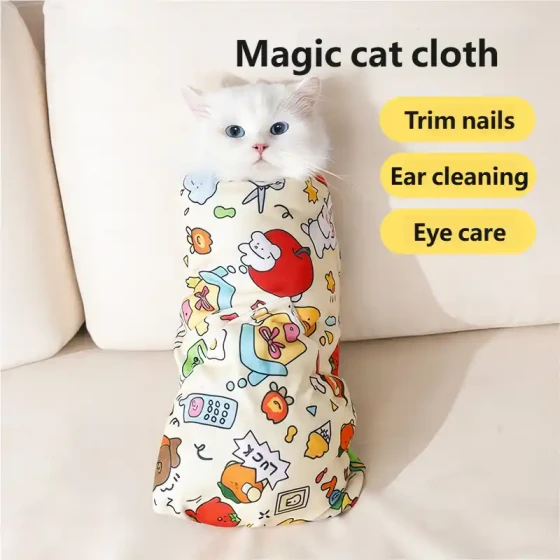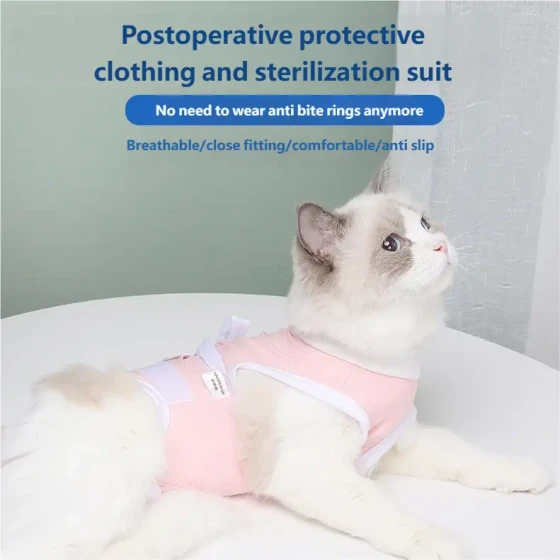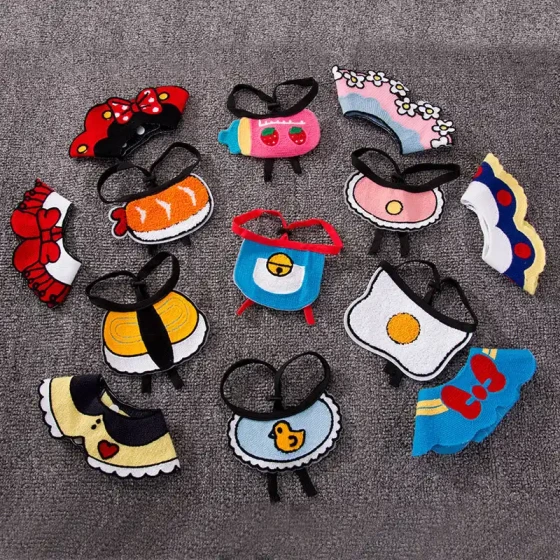Will Cats Hate Their Owners After Neutering_Complete Analysis of Psychological Changes in Cats After Neutering
Many cat owners worry when considering neutering surgery for their cats: will the cat hate me after neutering? Actually, this worry is mostly unnecessary. The neutering surgery itself does not cause cats to develop hatred toward their owners; they do not have human-like concepts of losing their “sexual” ability. On the contrary, after neutering, cats may become closer to their owners due to physical comfort and behavioral improvements.
Neutering cats is a common choice, not only to control the pet population but also for the cat’s long-term health and improved quality of life. Although the surgery causes temporary discomfort and some psychological changes, in the long run, the benefits of neutering outweigh the drawbacks.
Will Cats Really “Hold Grudges” After Neutering?
There are jokes circulating online that say cats will “hold grudges” against their owners after neutering and may express their displeasure in “colorful language.” While some cats do show emotional fluctuations after the surgery, such as becoming depressed, inactive, or temporarily ignoring their owners, this is mostly due to pain from surgery, anesthesia reactions, and stress caused by environmental changes, rather than true “hatred.”
Imagine when you are sick or uncomfortable, you probably just want to be quiet and not interact much with others. Cats are the same. Pain after surgery makes their bodies uncomfortable, anesthesia may cause lethargy, and the unfamiliar hospital environment frightens them. All these combined may show as “unhappy” behavior.
Some believe that if cats are neutered before sexual maturity, they may not even know they once had complete sexual abilities and naturally won’t feel a sense of “loss.” Even for cats neutered after adulthood, their memory is not as lasting as humans’, and they quickly forget the unpleasantness of surgery and get back to happily eating little fish snacks and playing with toys.
Therefore, cat owners need not hesitate about neutering due to worries about cats “holding grudges.” What is more important is to give them enough love and patience after surgery to help them recover quickly.

Complete Analysis of Psychological Changes in Cats After Neutering
Neutering surgery does indeed affect cats’ psychology and behavior, but mainly caused by changes in hormone levels rather than negative emotions toward owners.
1. Behavioral Changes Caused by Decrease in Sex Hormones
Sex hormones play an important role in cat behavior. After neutering, cats experience a significant drop in sex hormone levels, which brings a series of behavioral changes:
- Reduced heat behaviors: This is the most direct change. Male cats no longer spray urine to mark territory due to heat nor constantly want to go out seeking mates, greatly reducing the risk of getting lost. Female cats no longer go through frequent heat cycles that cause continuous crying, irritability, and reduced appetite. Imagine being woken up at midnight by a cat’s “howling” — getting rid of heat cycles improves life quality for both cats and their owners.
- Lower aggression: Especially in male cats, after neutering testosterone levels drop, reducing fighting and aggressive behavior, and their personality may become gentler and more clingy. This is very important for multi-cat households as it reduces conflicts among cats.
- More homebound and docile: Neutered cats tend to lose interest in the outside world, preferring to stay at home and becoming more “homebodies.”
2. Possible Emotional Fluctuations and How to Cope
Despite many benefits, some cats may experience short-term emotional lows or anxiety after surgery. This might relate to surgical pain, anesthesia effects, environment changes, and individual differences.
- Emotional low: Some cats become inactive, lose appetite, and seem lethargic post-surgery. This may be due to physical discomfort or feeling uneasy in a new environment.
- Increased sensitivity or irritability: A very small number of cats may become more sensitive or temporarily irritable and aggressive. This is generally temporary and requires patience from owners to soothe.
Facing these situations, owners need to offer more understanding and patience. Provide a quiet and comfortable recovery environment, spend more time accompanying them, and soothe their emotions with a gentle voice and stroking. If a cat remains emotionally low or behaves abnormally for a long time, consulting a veterinarian is recommended.
3. Personality Changes Are Not Absolute
It is important to note that neutering does not affect every cat’s personality in the same way. While most become gentler, individual differences exist. Some cats show less noticeable personality changes, and a very few may develop negative traits such as becoming more timid or sensitive.
Therefore, neutering should not be seen as a “cure-all” for behavioral problems. For cats with established bad habits, neutering may help mitigate some issues, but scientific behavior training is the more comprehensive solution.
Advantages and Disadvantages of Neutering Surgery
Beyond psychological and behavioral effects, neutering surgery itself has pros and cons that owners must weigh.
Advantages: For Cat’s Health and Happiness
- Reduced risk of diseases: Neutering significantly lowers the risk of reproductive system diseases. Female cats avoid issues like pyometra, ovarian cysts, and mammary tumors; male cats reduce risk of testicular tumors and prostate diseases. It’s like adding a health insurance policy that effectively extends their lifespan.
- Improved quality of life: Avoiding discomfort and irritability caused by heat allows cats to live more peacefully with better appetite and sleep patterns. They no longer risk injuries or infections from roaming to find mates.
- Controls pet population: Neutering is an important measure to reduce stray animal numbers and unnecessary births.
Disadvantages: Several Things to Watch For
- Surgical risks: Any surgery involves risks including anesthesia and postoperative infection. Though modern veterinary medicine is mature, owners should select reputable veterinary hospitals and experienced surgeons.
- Increased risk of obesity: After neutering, cats’ metabolism may slow down and decreased sex hormones can increase appetite. Without control, cats can become overweight, which raises risks for diabetes and joint diseases.
- Possible urinary tract issues (male cats): Some believe neutered male cats may be more prone to urinary problems like stones or obstruction. This may be related to reduced activity, insufficient water intake, and individual differences. Ensuring adequate hydration and exercise is very important.
Thoughtful Post-Neutering Care for a Safe Recovery
Postoperative care is critical to help cats recover faster and alleviate psychological discomfort.
- Provide a quiet and comfortable environment: After surgery, cats need rest. Prepare a warm, dry, quiet “exclusive space” to avoid disturbances. Place their bed, litter box, food, and water within reach to minimize unnecessary movement.
- Care for wounds as per vet instructions: Regularly check and clean wounds to keep them dry and prevent infection. Female cats usually require stitches on abdominal wounds, males have smaller wounds that may not need stitching.
- Use Elizabethan collars or surgical clothing: Crucial to prevent cats from licking or scratching wounds. Never underestimate a cat’s tongue — its barbs can cause serious wound damage.
- Provide proper diet and hydration: Cats may lose appetite post-surgery; offer easily digestible, palatable food such as prescription diets or canned food recommended by vets. Ensure ample clean water and encourage drinking to prevent urinary issues.
- Limit activity: Restrict vigorous exercise and jumping during recovery to avoid wound reopening. Male cats usually recover faster, females need longer rest.
- Patient companionship and soothing: Spend time with your cat, speak gently, and pet them to provide security and affection.
- Monitor mental state: Watch closely for appetite, urination, and behavior changes. If cat refuses food/water, is lethargic, or has difficulty urinating, seek veterinary attention promptly.
- Regular check-ups: Follow vet advice for postoperative visits to confirm wound healing and suture removal if needed.
Frequently Asked Questions
- At what age is it suitable to neuter cats? Generally recommended before sexual maturity, around 6 months old, but depends on the individual cat and vet’s advice.
- How much does neutering surgery cost? Costs vary by region, hospital level, and cat gender (female surgery is more complex and expensive). In major Chinese cities, male neutering may range from several hundred to over a thousand RMB, with female surgery generally higher. Specific prices require local vet consultation.
- Differences between male and female neutering? Male neutering removes the testicles and is a simpler surgery; female neutering removes ovaries and uterus, is more complicated, and requires longer recovery.
- Will cats definitely gain weight after neutering? Neutering increases obesity risk but does not guarantee weight gain. Controlling diet, selecting proper cat food, and increasing exercise can effectively prevent obesity.
- Will cats go into heat after neutering? Normally, complete removal of gonads means cats won’t go into heat. Rarely, some females might show heat signs due to ovarian remnants and need further checks.
- Will neutered cats spray urine randomly? Neutering greatly reduces urine spraying in males from heat behaviors. However, if spraying was a pre-existing habit or caused by other issues (stress, illness, litter box problems), neutering might not fully resolve it.
- Do neutered cats need nutritional supplements? Early post-surgery may benefit from supplements like recovery-specific canned food or nutrition pastes. Long-term, maintain balanced diet and control calorie intake to prevent obesity.
Summary
In conclusion, neutering cats does not make them “hate” their owners; this is largely a human emotional projection. Neutering does affect behavior and psychology mainly due to hormone changes and usually causes positive effects such as gentleness, reduced spraying, and being more home-friendly. At the same time, neutering effectively prevents many reproductive diseases and extends cats’ lifespan, ultimately benefiting their health and quality of life.
As responsible cat owners, when deciding to neuter your cat, the most important things are choosing a professional veterinary hospital, cooperating with vets for pre-surgery exams and post-surgery care, and providing sufficient patience and love to help your cat through recovery. That way, your cat can continue to live a healthy, happy life after neutering, with their "meow" life as wonderful as ever!





